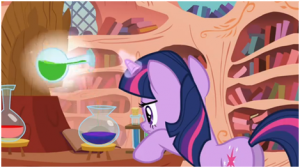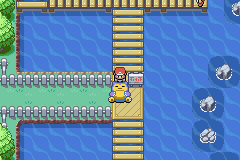Posts Tagged "poetry"
Underrated Never Talked about Skill for Writers: A Rambly Sort of Thing
Today in class I started bringing up theory again. Recently I’ve noticed my professor looks at me and smiles when I bring up some obscure topics and essays (I don’t know if she did that all semester or just felt nostalgic because today was the last day of class). This time it was a piece by a Korean feminist talking about masculinity in oppressed cultures. She said to me, “I’m always amazed by what you can bring to the conversation.”
Later tonight I went to visit a friend in the hospital. A week earlier she was just an acquaintance. In the hospital I argued with a nurse about why her pain wasn’t being managed and why the doctors seemed to think post-op pain of a 9 out of 10 was “normal” and didn’t need treatment. My mom was a pain management nurse and now teaches nursing at a university. I learned the lingo. I learned how to ask for drugs without seeming drug seeking. I learned how to advocate for my friend.
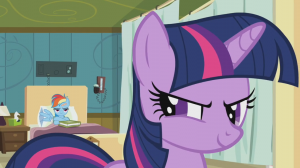
“I have a manipulative speech ready that will get you so many pain meds that you’ll need pain inducing drugs just to keep you on the pain scale. Crap, I think your charge nurse heard my soliloquy.”
On the drive home I thought about my teacher’s words. I realized something I decided was probably the biggest gift to myself.
I came up with two rules for myself:
1. Whenever I didn’t know something, I would ask about it.
This includes what words mean, things I claim to be an expert on, and things that people would probably prefer not to talk about.
2. I would let people talk to me about any subject.
I let my cousins and some of my friends teach me about cars. I’ve let my sister (a women’s health nurse) teach me about different speculum, benefits of clear plastic over metal, and that some of them have lights. My mom taught me about pain management in hospitals. I’ve had people talk to me about all kinds of subjects from Apple products to humor theory to rollercoasters to Wutang Clan.
If you don’t want to hear about something, it’s probably, because you don’t know enough to appreciate it.
These rules will help you develop a sense of curiosity and wonder for the human creature. Something that should show up in your writing.

This is from my lecture notes last fall when my Professional Writing Core teachers were explaining that curiosity and wonder are at the center of all art.
Now people will go out and people watch. Wonderful activity, but also very shallow and superficial. You’ll only get the surface without context. If you talk to a person, they will teach you about entirely new ways of seeing the world, maybe these ways aren’t always positive. Of course this is granted they even want to talk to you.
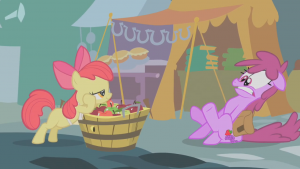
“Aaah! A humanities major working retail! Get your low income potential and broken dreams away from me!”
“That’s interestin’ and so tellin’ about yuh social background, upbringin’, ideologies, and yuh way of life.”
Most people want to talk about things. Some people will even talk to you about the worst tragedy to ever happen to them. More people will tell you these things if they feel you’ll listen and understand.
I won’t tell someone to stop talking. I’ll interrupt, because I’m so excited about the conversation, but I won’t tell them to stop talking.
It’s beautiful. The human being. I was with a girl and angry at the world. I said, “I have never felt so misanthropic.”
She laughed (and not just at how angsty I was being), “You’re not a misanthrope. You’re an anthropologist. I’ve never seen someone so in love with people.” This was a surprise to me. I didn’t realize this was true. I also didn’t realize she could ever show this level of understanding about me. At least I used to think that. It must be untrue since I fell in love with her.
Talking to people, reading their blogs will expand your mind more than anything (Even if it’s starting to get unfocused, rhapsodize-y, and digressive). You’ll never know what you’ll learn and from where. Did you think you would find a passionate, sincere, intellectual blog about the human condition with a bunch of ponies on it?
I’ve talked to a drunk punk rock bassist in the Inland Empire about his view on the world, it was disparate from the views of a privileged girl I talked to in Orange County, but there is always confluence. We want the same things: love, respect, to feel special, safety, etc.
We all have the fear of time and being mortal adding pressure on our desires. From this is conflict. From this we do our worsts to each other and even our bests. When written with justice to the characters, this conflict will allow you to see yourself in the worst of people as well as the best. We are all the same, it’s the priorities and the situations that make us different, whether by nature or nurture.
There’s a price to this, the more you learn what people want and their motivations, the harder it is to judge them. Although, this seems positive, keep in mind that these people will make you mad. They will hurt you. You will feel mad and stay awake at night. You’ll wish you were just wondering why they would do something to hurt you, but you’ll know why. You’ll know their motivations, what they want in life. You’ll know that if you were them, desperate for the same petty things, then you would hurt other people for them as well. It would be hard and wrong for you to hate them for being who they are. So you don’t take any action, even though you’re hurt.
With this understanding there’s nowhere for your hate and frustrations to go. You’re stuck with them.
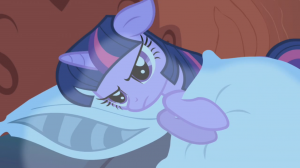
“I understand that her belief system doesn’t allow for the idea of platonic friendships between people of opposite genders, but that doesn’t mean she is entitled to treat me like a second class citizen even if she is trying to keep me from ‘falling for her.’ God that’s so egotistical, it’s sick, but then that belief has probably just been reenforced by a lifetime of being a pretty girl and having every guy friend fall in love with her, requiring her to explain why things wouldn’t work out. The poor girl probably lost a lot of friends growing up. Man this sucks that her past is determining why I don’t get to have my friend! After all the times I’ve looked out for her! Well, this might be her form of looking out for me and my feelings… Why am I always the expendable one?! I hate this.”
Sorry, where was I? Oh, yeah, people will reveal more to you than they realize. They will tell you their ideologies, their secrets, their experiences even if they don’t intend to. And isn’t understanding how other people think and act what character work is all about?
That’s not necessarily a rhetorical question. Let me know how you think about anything I’ve brought up. Clearly, I’m interested.
PS. For more on this subject read Virginia Woolf’s short story “An Unwritten Novel” to get the value of people watching and some of its drawbacks. For the benefits of talking to people and how you can learn things about their character that they themselves don’t even realize they are saying read Robert Browning’s “My Last Duchess”
Read MoreA Thousand Words or So to the Community College Bound
One of the lies we are told growing up is that if you study hard in high school, then you’ll make it to a big school and that school will be the key to your success. Not doing your work will get you a McDonald’s job. I have found this to be the adolescent equivalent of “keep making that face, and it will stick that way.”
Going to Mt. San Antonio Community College didn’t equal my failure. After completing the requirements, I applied and got into UCLA, Berkley, & UC Irvine. At the time UC Irvine was the one with the most impressive English program so I went there (Yes, better than UCLA). When I went there I ran into the salutatorian of my high school class who could only demand “What the hell are you doing here?!”
Although she never liked me, this wasn’t the reason for her outrage. She was pissed because throughout high school she acted the way she should have, and I didn’t. She had a GPA above 4.0 in high school. Mine was more like 3.0 (for an honors kid this was like having the GPA of an etch-a-sketch). Yet, there we were sharing the same prestige, in fact I saved about $50,000 for dicking around in high school. Isn’t there a bible story on this?
Reason 1: You can get the same degree with about half the debt. This will help, because your English degree from that top university won’t get you a decent job. It will just help you beat out people without degrees for crap jobs.

“You have a degree in the arts? Nice. Help Derpy with the art of loading this van, also she’s your boss.”
For me community college wasn’t a stumbling block, I knew this was a dangerous place where if I didn’t take things seriously, then I would never escape its publicly funded clutches. This caused me to stop looking at my GE’s as something in the way of my real academic pursuits. They became a means to an end.
It turns out that writers need to know more about the world than just writing. Otherwise they’re writers writing about writing. Although, I’ll admit, I find writing the most fun when I’m writing about writing or writers or writer problems, but sometimes it might be cool to write a piece about a marine biologist, or a piece that explores philosophical ideas, and I’m sure a course in chemistry didn’t hurt the writer of “Breaking Bad.”

“Hydrofluoric acid will eat anything but certain plastics? That’s neat and all, but when is this EVER going to turn up in my writing?” –Vince Gilligan (not really)
Reason 2: Community College is a death trap and the fear of it might make you actually study and learn things you can use in your writing.
When you transfer to a four year school you may notice a few changes. At UC Irvine I noticed that instead of being taught by an experienced adult with several publications and familiarity with the writing game, my instructors were replaced with grad students who were about my age and felt uncomfortable about the “Where have you been published?” question.
To be honest, I got lucky with most of my graduate instructors, most. Each of them offered me something new that has changed my views on writing forever, that includes the, um, less awesome TA’s.
But my community college mentor John Brantingham has done more to shape my views of writing than any other professor. In fact, he has probably shaped the fiction sections of “Writing Is Magic” more than any of my other professors.
Reason 3: Community college instructors tend to be more experienced teachers and writers (of course your own experience is subject to change).
Even if your counselor is like “Yeah, you totally took this class in community college!” there’s probably someone in the English department who is like “You’re going to have to take all your creative writing classes over again.”
So you will start again and you’ll listen to someone else talk about writing, but wait! This isn’t what a story is! This reading assignment doesn’t fit into what I was taught! Clearly I went to the wrong school! What’s Post-Modernism?! AAAAAH! THIS IS ALL WRONG!
This is fine. You came from one school with one way of doing things, and you’re entering a new school with a new way of doing things. The changes can be dramatic or subtle. If you’re lucky it’s dramatic and intimidating. Your mind will have to figure some way to reconcile the aesthetics and find your own path. Take what works. Leave what doesn’t. Don’t forget what doesn’t work; just leave it alone. It might be a key ingredient to your writing later on. If you aren’t going through these growing pains, THAT’S when I would worry that I didn’t go to the right school – but then maybe you did.
You might find yourself being behind the other students who already get the house style. They’ve been here since they graduated high school. This is the only way they know how to think about writing. However, as you start to find your voice, you will be the one with the advantage and confidence.
They have only attended one writing program. By this point you have attended two. They are a product of their program, with all of its strengths and weaknesses. Hopefully, you’ve managed to fill in the holes of your new four year school with the strengths of your community college teachings.
By your final years, you might be one of the finest writers in your program. You might even give some of the MFA’s a run for their money. But don’t be discouraged if your colleagues can’t see it; when they go off to do their MFA, you will get reports back saying “Remember what you said in workshop? Well, my professor said the same thing!”
I’ve said things in a peer workshops which were laughed at, and I was brushed off as having silly theories about writing. I said the same thing at USC and my professor actually applauded (If I’m not nominated for a TED talk in the next 3 years, I’ll do a video on it here).
You see everything they’ve been told to think about writing they got from one source, probably the aesthetic styles of whoever runs the program. Since you are their peer, you’ll lack credibility to have new ideas brought in and respected by the ego-driven crowds. To say something that disagrees with the house style, no matter how flawed the house style is or how sound your reason is, they will think that it is you who doesn’t understand. So they will need someone of merit to tell them the same thing you did before they’ll listen. (Befriend those who are open-minded enough to listen to you; this will keep you sane.)
Reason 5: No creative writing program is perfect. Each has its strengths and weaknesses. Already having a few creative writing classes from a different perspective will help you compensate for some of the weaknesses. If you didn’t go to community college, you’d have to wait until grad school to have this experience.
Although this was just my experience. Your experience may will vary. If you’ve gone through the community college system, feel free to comment on how it was like for you.
Reading Chinua Achebe Part 3: UC Irvine
Click to read:
Part 1: High School
Part 2: Community College
At UCI some of the writers were easy to spot early on. If someone was helpless in the literature class, they were probably a writer. Sometimes they would defunct a reading by saying “That’s not what writers do,” instead of, you know, something not stupid. They had trouble with the type of thought required for literary criticism/critical theory. They were developed to think more from an angle of aesthetic criticism. In community college, critical theory and aesthetic theory seemed to go hand in hand. I didn’t realize that they had any difference or that there was a time and a place for each. I’ll discuss this more in the future.
In this quarter I was just starting to learn to separate my two parts of theories of literature. This should have been easy. I was an argumentative Muslim-agnostic living in a Christian country in a very divisive period. I also had the luxury of being able to pass for Middle Eastern, Hispanic, and/or Caucasian (Yes, even with a name like Sharif. *shrug* People are dumb?). When people were arguing about the benefits of locking Muslims up for no reason, then I couldn’t argue like an Arab (I’d sound biased). I’d have to argue like a white Republican American Christian. I’d point out contradictions of their arguments with the beliefs they testify to like a combination of Ditto and Pheonix Wright. The way most people code switch from the way they speak at home to the business casual vernacular they speak at work, I could code switch between ethos. Like Super Nintendo cartridges. Off. Pop. Blow. Swap. On. Let’s play.
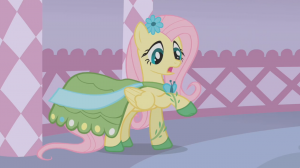
“‘Lock up all the Muslims?’ Where’s that Christian-American ethos cartridge? *blow* I think at a point we need to trust God to protect us. If we commit sins against the innocent due to our fear, then it shows a lack of faith in Christ. In addition, I believe that the terrorists can only destroy our buildings, but the American spirit of freedom can only be destroyed by jingoism and fear stirred up in ourselves. How can you talk about protecting freedom while talking about incarcerating the innocent? How can you be American, but advocate religious persecution? We must walk the careful line between vigilance and oppression. Of course, whatever you believe is fine, because this is America.” -Bush Administration Sharif
However, separating literary criticism from aesthetic criticism was like separating the water from Kool Aid. Especially when you don’t know that there is a such thing as aesthetic theory. It was mostly just “How do I reconcile what this person says about literature with what this person says.” For survival purposes this required a bit of Schizophrenia. Think this way on Mondays and Wednesdays; think another way Tuesdays and Thursdays. This process took me years of confusion, internal rhetoric, fights with professors, fights with grad students, looking like a jackass, fear, anger, hate, and suffering.
I read Things Fall Apart twice this quarter. The first time I read it was to refresh the story in my mind for class discussion, the second time was to write an essay.
In retrospect I realized that the first time I read it at UCI, I read it very much from a critical theory standpoint. The Igbo culture was a microcosm of the greater struggle of Africa being caught between cultures (though perhaps too obvious, general, possibly not true, and worst of all not enough to make a paper on).
When it was essay writing time, I reread and started hunting for quotes and such. This time, for some reason, I was looking more at the aesthetics and techniques of the book. The language was new for me. I guess this was the first time I really looked at the prose. It was clear and direct, simple yet elegant. There was no pretension trying to wax as wisdom. It was just wise. Direct, effective, adaptive, and powerful like Bruce Lee’s approach to martial arts, but with words. Things Fall Apart is a book as much to be experienced as it is to be read, analyzed, and understood. The language doesn’t have to create a faux complexity and play a game of “hide the secret;” the complexity comes from the honesty, empathy, and understanding from the author.
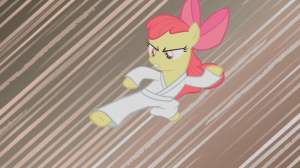
“The best form is to have no form. Unless it is poetry, then the best form is the villanelle.” -Bruce Lee (not really)
I noticed the use of folklore, which was a minor theme throughout other works we were studying. So I wrote an essay on that. I said how the story of the tortoise and the birds was a microcosm of the greater novel. I further went on to point out how folklore and a character’s relationship to it was used for characterization and to set up various plot points and relationships including relationships with one’s culture.
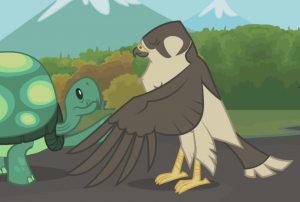
“Let me have some feathers so I can go to the bird feast in the sky. Seriously quit being a dick.” – Things Fall Apart (not really)
I was super excited for this essay, which is a bad sign I’ve learned. I have a passion for aesthetic theory, which means that it isn’t something I should turn into the critical theorist TA.
I remember right before the essay was due, many of my classmates were at a complete loss of what to write about since there were no prompts. So I started handing prompts out on subjects I saw but wasn’t passionate about. Write about the effects of colonialism on women as described by Wole Soyinka in “The Lion and The Jewel” and Mirama Ba’s So Long a Letter. Use Ngũgĩ wa Thiong’o’s Weep Not Child and Tsitsi Dangarembga’s Nervous Conditions to talk about the role of Western education in African self-awareness (Helpful hint, bring in the teacher’s book Decolonizing The Mind).
These prompts were very literary critc-y. Everyone who took one of my prompts got an A or an A-. I got a B- on my paper! Apparently, an ethnocentric feminist gaze of African polygamy had more legitimacy than discussing the use of African culture to show the greater book as a macrocosm of a piece of folklore.* Although, it might have helped streamline my paper if I actually knew the words “microcosm” and “macrocosm” when I was 21.
Speaking of folklore, I think I’ll end this in an Aesop. I was the same human being reading the exact same copy of a book, yet I wasn’t the same person. My worldview had shifted and so did my view of the world created by Achebe. If you’re a writer trying to control exactly how people read your book, you are fooling yourself and wasting your time. People will experience their own book, movie, comic, play, poem…
*It also might have helped to have incorporated Keat’s concept of the gyre, which today I still don’t quite understand. It’s like a self-referential vortex…kinda? I’m starting to remember why I didn’t try to put that in the essay.
Read MoreReading Chinua Achebe Part 1: High School
So like many people I learned about the death of Chinua Achebe through Facebook, and then confirmed it with Wikipedia.
I’ve only read three things by Achebe: Things Fall Apart, a short story I hated and don’t remember, and some essays that gave me mixed feelings.
Things Fall Apart is one of my “which books had a profound impact on you” books. I’ve read it about 4 times. The only long form piece I’ve read more is Shakespeare’s “Hamlet.”
High School: Okonkwo was me. Full of rage and ready to pounce on anything that would give me the opportunity to fuck it up, verbally or physically. I once had a place of status among my friends, but I learned what depression is and began questioning my faith in God. This was around the time many of my Catholic friends were going through confirmation. I talked with them hoping that they could help me with my crisis of faith, which I don’t know if any of you have had this before, but it hurts. But my questions were echoed to members of my friend’s churches, and they were told that I was “the devil trying to lead them from the path of Christ.” I wasn’t the devil, but I was burning into impotent ash. I was a kid who was lost, confused, and in pain, but I guess that’s just as dangerous to people whose faith is no stronger than wet newspaper.
Religion had seemed to take away all of my friends. My best friend who taught me how to make inappropriate jokes decided that he was going to become a priest. And apparently one who wishes to be like Christ cannot hang out with sinners.
My grades were falling. Nothing made sense. I was fighting with my family, friends, enemies, strangers… everyone was my antagonist. The people who understood me seemed far away. They weren’t in the honors classes. Yet this fucking book understood. The people I skated with understood. They appreciated that I was the voice of reason while at the same time down to punch someone in the face. My English teacher understood and came to my rescue when things got out of hand (Forgive me, but I’m not ready to tell that story yet).

“I’m not violent. I’m just teaching a lesson about not being a punk-ass bitch to a tactile-kinesthetic learner.” -Adolescent Sharif
I was a slow reader, still am. I needed longer with the book before returning it to the library. My English teacher knew that usually I would just prematurely surrender the book. This time I wanted to finish it. My English teacher was understanding. The best English teachers are. I think this is why Holden trusts the English teacher in Catcher in the Rye. This is why the written word won’t die.
I went to New Mexico with my mom for a few days. My mom told me to use this as an opportunity to relax but also catch up on the school work that had seemed too pointless and overwhelming during my state of depression. I took Things Fall Apart with me. The TSA opened my bag, because one of their sensors said my public school textbooks had suspect chemicals, which were later cleared as not being a bomb. I told my English teacher about this, and she told me to throw the book away. I told her that the book seemed just fine. She then told me to keep it and pretend we had to throw the book away. Then she pulled out a little card with student’s names and book titles. Next to mine she crossed out the words Things Fall Apart. It’s on my bookshelf, just behind my green screen.
Reading Chinua Achebe Part 2: Community College
Read MoreThe Not Completely Obsolete Typewriter
It’s been awhile since I had originally written about the stupidity of the typewriter. Years have passed, and I still think it’s dumb for a writer to try to use it in order to convey some sort of personal image as being writerly. However, when I attended a workshop in the home of poet, mystery writer, and educator John Brantingham, he presented an argument that typewriters weren’t completely useless.
In fact this argument was compelling enough to make me start actively seeking out typewriters in antique shops. Although, I still haven’t found a cheap one that isn’t at least partly, if not completely broken.
Brantingham has two small, cute, purely mechanical typewriters in his home in addition to his computer machine. We had taken a break from his lecture on novel writing and discussion went to the typewriters. I mentioned my blog inspired by UCI students who were impressed by some poet who typed on a typewriter. They didn’t think he was an impressive poet because of his poetry, but because he typed his poems on a typewriter (the “real” way).
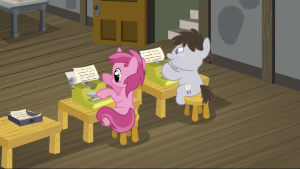
“I thought I could fool editors by typing my poems in American Typewriter, but when I got a rejection, I knew it wasn’t working.”
Although Brantingham would jokingly deny ever having thought out a thing in his life, everything he ever says always seems as though a careful amount of time and critical thinking had gone into it. Maybe it was just that his words always seem free of bullshit, which sets a very high standard for a creative writing teacher. Many of them have their snake oil that they buy into, in the worst of cases that snake oil destroys writers. “Destroy” can mean innumerable things.
“You know, the great thing about typewriters is that you can’t go back and edit.” This solves the problem of writers going back through their work and tinkering as they go, a common problem.
I had this problem in the past and considered a typewriter to force myself out of it. However, when I thought of using my parent’s electric 1000watt motorized Snorlax sized typewriter, I just thought it would be easier to just be a terrible writer (the kind that splits infinitives apparently).
Brantingham told me that I should buy a cheap, small, purely mechanical typewriter which would be built to last forever, and it should only cost me about $25. To be fair the last time I went antiquing in Pomona, the cheapest I found was about $35 and most of the ones under $100 were mostly just broken beyond explanation of why they weren’t in the trash. Although, I think he said something about getting one made around 1920 while the ones I looked at were 1960’s. I don’t really remember, sorry. Also he’s probably better at antiquing than I am. Also I only went to like five places.
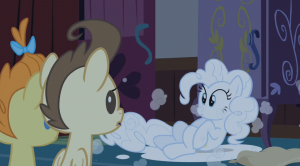
Antiquing? Is this a CKY/Jackass reference joke using a scene from My Little Pony? Yes. Eclecticism is something I pride myself on.
I told Brantingham, “Well, you still have to retype it.” I mean come on! The digital world is sucking us all into it (Digimon was right). Brantingham had answers for this. He has answers for everything. I fear the day he doesn’t have an answer the way people in nowhere towns fear terrorists might attack their local Wal-Mart.
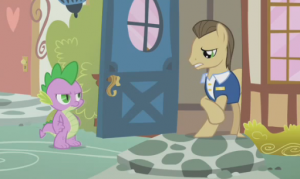
“I realized how dependent the Nowheresville, Kentucky’s economy is on the Wal-Mart, so now I am afraid to go to work in case there is a terrorist attack, like when they blew up the towers.”
He explained that typing your work all over again sentence for sentence and word for word will help you think critically about what you’ve written. It highlights syntax, word choice, and tense shifts as well as other problems. It’s perhaps the most in depth first edit you can get.
I think we all could benefit from retyping our work, but wait a minute. Couldn’t we just print it out? Why can’t I just use willpower to not edit?
Well, while writing you’re usually fighting a lot of different urges to do other things. Writing is hard, and you might want to do something less hard. Ron Carlson wrote an entire book about this aspect of writing. This method would take willpower which could be diverted to your not checking Facebook or going outside and getting some Taco Bell when you should be writing.
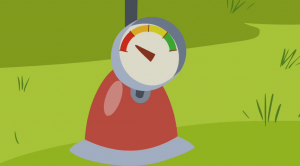
“The machine says you have just enough willpower to go 230 words before watching more low quality uploads of ‘Rocket Power’ on Youtube.”
That caption reminds me; the internet might be a good reason to invest in a typewriter.
Edit: Upon reading this blog, Brantingham explained to me the internet is the best place to buy typewriters. This blew my mind, because I just imagined shipping costs would be ridiculous. I guess typewriters fit into those “fits it ships” boxes.
Read More





